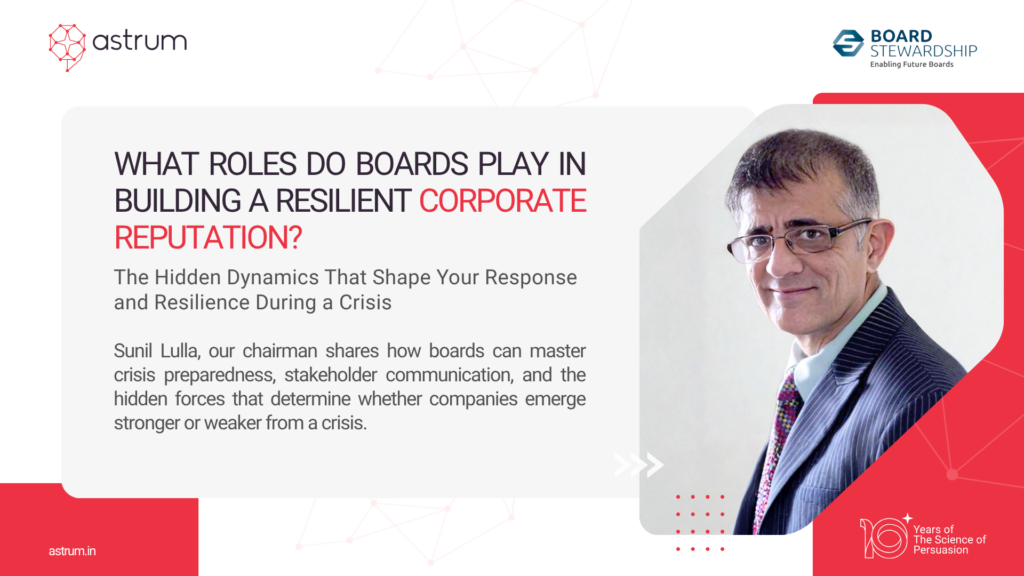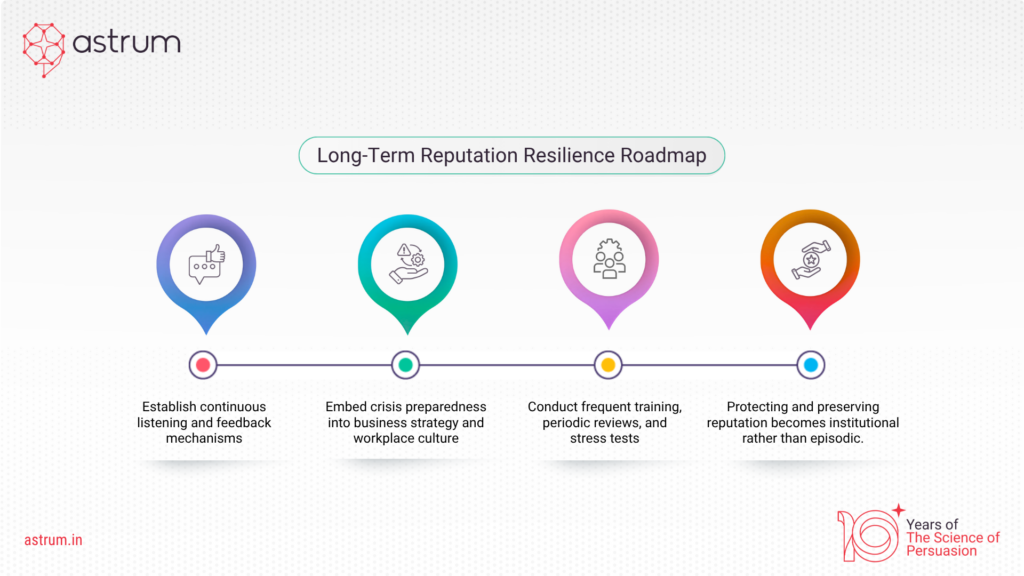What Roles do Boards Play in Building a Resilient Corporate Reputation

The Hidden Dynamics That Shape Your Response and Resilience During a Crisis
Companies across industries and markets do not operate in isolation; they are deeply embedded in society and therefore, exposed to all kinds of risks, including wars, cyberattacks, natural disasters, economic downturns, or policy shifts. Risks can also arise from personal controversies involving senior leaders or promoters, potentially drawing the company along with the individual into trouble, as we saw in the recent controversy involving senior leadership at Astronomer.[1]
The immediate impact of these risks may affect the company’s operations or financial performance, but long-term damage can harm the reputation, eroding trust, loyalty, and brand value. The recent tragedy involving Air India illustrates this: whilst the airline should be complimented for swiftly taking curative steps, yet their communications could not fully reassure the travellers about safety and customer experience. Air India’s case highlights that in crisis management, agility, transparency and clarity in communications are just as important as its action.
Therefore, protecting corporate reputation should not be considered a reactive measure, but a strategic imperative. A resilient and proactive Board is essential for enabling management to navigate such known and unprecedented crises.
The Board’s Role in Navigating Hidden Dynamics
The Board shapes how management identifies and responds to reputational threats, both present and potential, by influencing unseen forces such as decision-making patterns, organisational culture, and risk perception that decide the outcomes. It provides guidance in identifying and neutralising any misinformation, hostile propaganda, and strategic risks that could diminish trust among employees, shareholders, partners, and customers. The Board not only oversees compliance, but it also actively creates the underlying conditions that enable a company to respond effectively under pressure.
To fulfil this responsibility, Board members must possess a comprehensive understanding of regulatory, business (operational), and governance vulnerabilities that could escalate into reputational challenges. Their oversight sets the tone for agility, preparedness, and accountability, reinforcing the hidden structures that underpin the company’s resilience.

Key Actions Taken by the Board for Effective Crisis Management
First, establishing a well-defined crisis management & crisis communications organisation ensures that proper and empowered crisis management structures are in place. Second, game out scenarios and rehearse the response to ensure the management structure ‘in place’ is also ‘in use’. Plan for the worst and hope for the best. Take, for example, the Tata Group’s response during the 26/11 Mumbai attacks[2] when the late Ratan Tata, Chairman Emeritus, personally supervised the crisis response at the Taj Mahal Palace Hotel, to ensure the
safety of guests and staff. From swiftly mobilizing the required resources to control the situation to the subsequent setting up of the Taj Public Service Welfare Trust to provide financial and rehabilitation aid to the victims and their families, he set an example showing how empowered task forces are critical for preserving a company’s values and strengthening public trust.
Strengthen preparedness by leveraging external expertise. Specialists can help formulate crisis response strategies that comply with regulations and maintain stakeholder confidence. Boards guide management in bringing in the right expertise early. My colleagues at Astrum, led by our Founding Managing Partner Ashwani Singla, possess rich experience and deep expertise in helping boards prepare effectively to protect their corporate reputation and emerge stronger from a crisis. Whether it is a cyberattack, a product failure, a governance lapse, or an industrial accident, they have guided many clients in successfully navigating the complex landscape of reputation, risk, and regulation.
Identifying and prioritising key internal and external stakeholders. In a crisis, who the company talks to, and how, often matters as much as what it communicates. It is the responsibility of the Board to identify and prioritise the key stakeholders–-employees, customers, investors, regulators, and the wider public–-and ensure they are provided with precise, timely, and consistent messages. Honest and transparent engagement helps prevent misinformation, reduces speculation, and fosters trust.
Responsible use of media and digital channels. The Board ensures that corporate communication during a crisis, regardless of its nature or magnitude, is transparent, accurate, and timely. This helps strengthen stakeholders’ confidence and trust in the company’s credibility and accountability. Going back to the Tata Group example, the company’s clear and empathetic communication through various media channels during the 26/11 terror attack helped manage public perception and reinforce the company’s commitment to its stakeholders throughout the crisis.

Roadmap for the Board to Build Long-Term Reputation Resilience
Real business agility and resilience are built long before a crisis strikes. The Board, therefore, must embed crisis preparedness into business strategy and workplace culture, rather than treating it as a standalone exercise. This involves leading regular scenario planning and simulation exercises with crisis organisations, enabling them to remain alert and prepared for unprecedented situations.
Equally important is establishing continuous listening and feedback mechanisms so that crisis protocols evolve to address all kinds of emerging risks, rather than becoming redundant. Frequent training, periodic reviews, and stress tests help teams stay sharp while aligning corporate messaging with core business values. This alignment reinforces the company’s standing and purpose. In doing so, protecting and preserving reputation becomes institutional rather than episodic—strengthening both resilience and trust over the long term.
Thus,
Effective crisis preparedness does more than just shield reputation; it also enhances it. Companies that respond with agility, clarity, empathy, and accountability often emerge stronger, with deeper stakeholder trust and reinforced credibility. For the Board, crisis preparedness is not discretionary; it is a strategic priority that shapes the company’s resilience and long-term value.
Here are some questions for a self-diagnostic check of your preparedness. Score yourself on a scale of 1-3, with each score of 3 indicating urgent action required.
- Do you have a well-established crisis organisation with clear roles and responsibilities?
If, yes, when was this last updated?
- Less than a quarter ago
- Less than a year
- More than a year ago
- Do you have an updated list of cross business reputational vulnerabilities?
If yes, when was this last updated?
- Less than a quarter ago
- Less than a year
- More than a year ago
- Have you gamed out the scenarios and run your worst nightmare simulation?
If yes, when was this last undertaken?
- Less than a quarter ago
- Less than a year
- More than a year ago
The article was originally published in the latest issue of Board Stewardship. Here’s the link to the original article: Click here

Chairman
Sunil Lulla is the Chairman of Astrum, India’s first research-based strategic communications consulting firm that helps clients successfully negotiate the complex landscape of Reputation, Risk, Regulation & ESG.
Sunil is known for his success in growing sustainable businesses, building enduring brands, and shaping organizational cultures. He brings deep insights into Indian consumers and in managing growth, business, and competitive strategy, mentoring the Promoter/ Next Generation/ CXO. Sunil continues to serve on Boards of listed companies and is very familiar with the governance principles and management of Boards.
For most of his storied career spanning close to four decades, Sunil has been in a leadership position, ensuring profitability, building marketplace success, and driving high employee engagement. These include MTV, SONY, The Times Television Network, Indya.com, HMV, Diageo, Balaji Telefilms, JWT, GREY group and BARC. He is the Chief Evangelist of The Linus Adventures, an advisory service focused on enabling businesses to compete, grow their brand and build their culture.
[1] https://indianexpress.com/article/world/us-firm-astronomer-probes-ceo-andy-byron-viral-coldplay-video-10135939/
[2] https://www.timesnownews.com/business-economy/industry/a-leader-in-crisis-when-ratan-tata-stood-outside-hotel-taj-for-3-days-during-26/11-terror-attacks-on-mumbai-article-114134948

